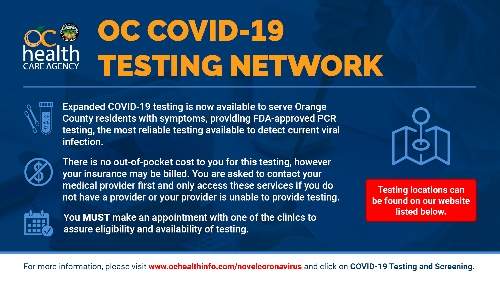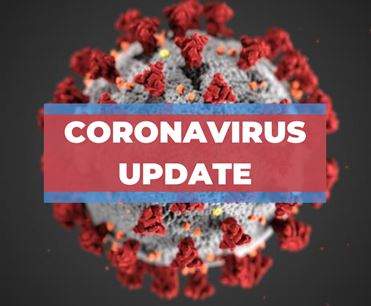
Testing for SARS CoV-2 is becoming more widely available in Orange County. The following recommendations are intended to help healthcare providers prioritize testing of a wider group of patients as resources allow. They are based on recently-released California Department of Public Health (CDPH) guidance, which can be found here.
Recommendations for Testing of Symptomatic Patients
The following groups should be considered for testing when they develop symptoms:
Priority 1:
• Hospitalized patients
• Healthcare workers
• Residents and staff of congregate living facilities and correctional facilities
Priority 2:
• Persons in essential health and public safety occupations, including first responders and law enforcement
• Persons >65 years of age or with chronic medical conditions
Priority 3:
• Persons in essential infrastructure occupations, including utility workers, food supply workers, and other public employees
Priority 4:
• Community-based testing of all low-risk symptomatic persons
Recommendations for Testing of Asymptomatic Patients
Testing of asymptomatic persons is most useful when used to control outbreaks in distinct groups such as residents or staff of congregate living settings such as skilled nursing or assisted living facilities or correctional facilities. In these settings, results help to identify potentially infectious persons to stop the spread of COVID-19 in specific populations.
CDPH also recommends testing of hospitalized asymptomatic patients prior to entry into skilled nursing facilities to prevent outbreaks in these settings.
Outside of these situations, routine PCR testing of asymptomatic patients or staff should be avoided. A result from such testing only reveals a person’s status at a single point in time. This information is of uncertain benefit when exposure risk is ongoing.
COVID-19 Testing Sensitivity and Specificity
The sensitivity of nasopharyngeal COVID-19 PCR testing in symptomatic patients is unknown but estimated to be in the range of 60-80%.
• A negative test should not be interpreted to rule out COVID-19 infection.
• PCR testing of lower respiratory specimens such as sputum, or bronchoalveolar lavage or tracheal aspirate specimens, may increase sensitivity and should be performed in addition to NP testing if available, especially if there is high clinical suspicion for COVID-19.
Testing of Mildly Symptomatic Persons
Moving forward, testing of persons with mild illness will become increasingly common. Such testing can help a patient understand his or her infectious and clinical status and as community social distancing measures are relaxed, broad testing to identify mild illness will be necessary to help prevent community spread of infection. However, to prevent exposure in a clinical setting and to preserve PPE, mildly symptomatic persons should be referred to community testing sites such as drive-through events if possible. A list of community sites offering COVID-19 NP PCR testing to symptomatic residents can be found here.
OCHCA Public Health Laboratory Testing
OCHCA’s Public Health Laboratory can assist with testing Priority 1 groups: hospitalized patients, symptomatic healthcare workers and symptomatic residents/staff of long term care facilities (LTCF). Results from OCHCA’s lab can return substantially sooner than commercial labs.
Serologic Testing
The clinical value of serologic antibody testing has not been clearly demonstrated. Serologic testing should not be used routinely to assess patients for acute infection or long term immunity.
• Serologic testing should not be used to diagnose acute infection.
• False negative results can occur, particularly early in infection.
• False positive results are also possible due to potential cross-reactivity with routine coronaviruses that cause mild respiratory infection (e.g. HKU1, NL63, OC43, 229E).
• At this point, serologic testing for the presence of SARS-CoV-2 specific antibodies has not been determined to provide reliable evidence of immunity.
• There are currently over 70 commercial manufacturers and laboratories marketing serologic assays for COVID-19 antibody testing without an EUA under the new FDA policy. These tests have not been authorized or reviewed by the FDA and have not received a CLIA categorization. Without an EUA, the tests are considered high complexity and can only be performed in laboratories which are authorized to perform such high complexity tests.
• Serologic testing may be useful at the population level in epidemiologic studies to determine disease incidence in the community.
Contact Information
Providers can contact the Communicable Disease Control Division at 714-834-8180 for questions or concerns or to arrange for Priority 1 patient testing. Please note that this number is now operational 24/7 for medical providers. Please do not share this number with patients.

